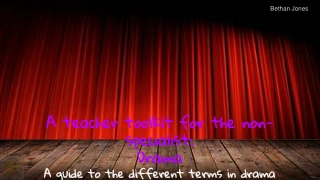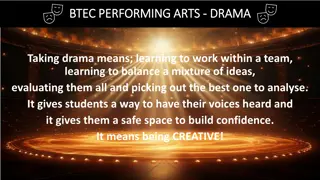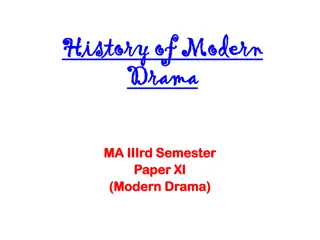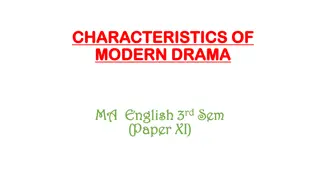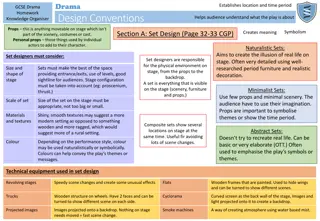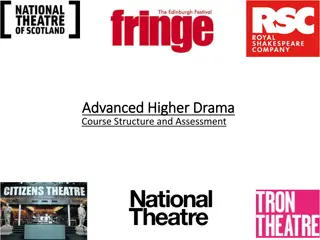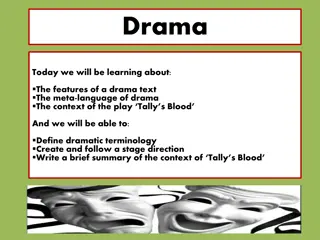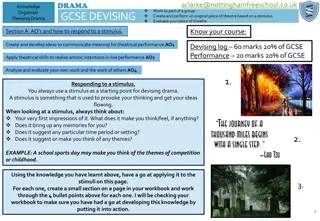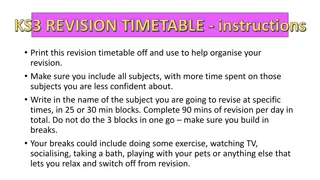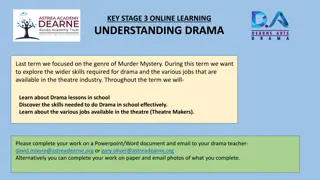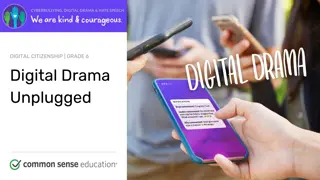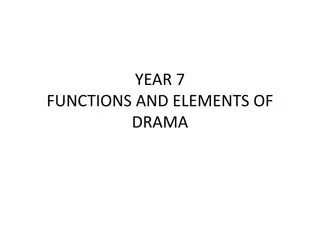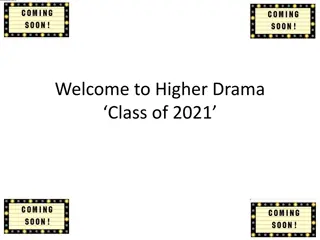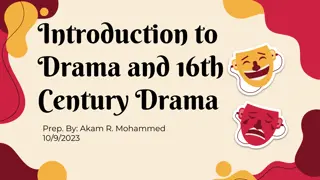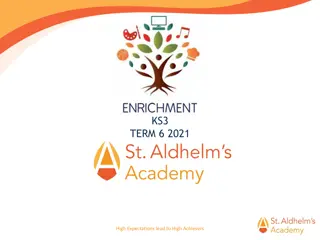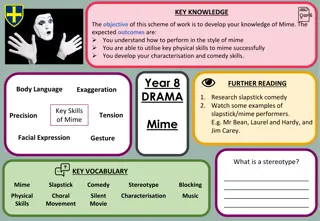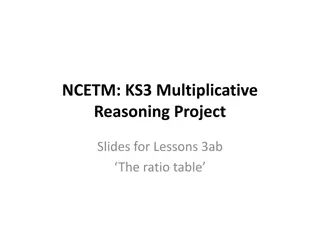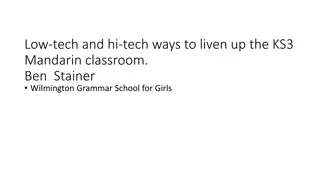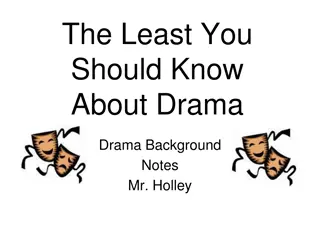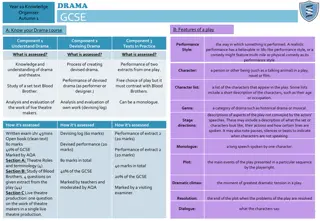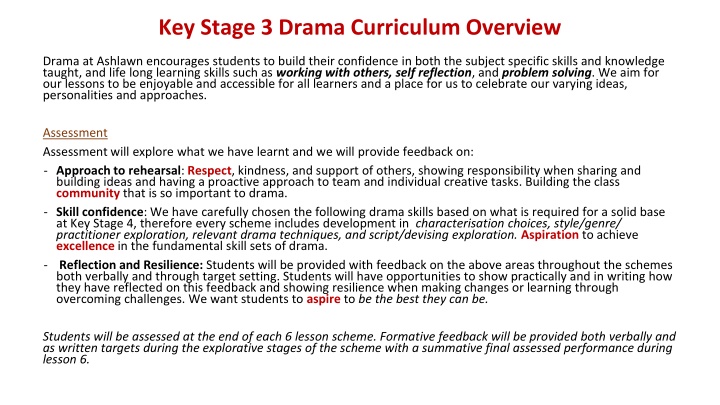
Drama Curriculum Overview at Ashlawn: Key Stage 3
Drama at Ashlawn focuses on building students' confidence in subject-specific skills, teamwork, self-reflection, and problem-solving. The curriculum includes various topics like fairy tales, horror genres, comedy, mime, and more, aiming to develop essential drama skills and encourage excellence through practical assessments and feedback.
Download Presentation

Please find below an Image/Link to download the presentation.
The content on the website is provided AS IS for your information and personal use only. It may not be sold, licensed, or shared on other websites without obtaining consent from the author. If you encounter any issues during the download, it is possible that the publisher has removed the file from their server.
You are allowed to download the files provided on this website for personal or commercial use, subject to the condition that they are used lawfully. All files are the property of their respective owners.
The content on the website is provided AS IS for your information and personal use only. It may not be sold, licensed, or shared on other websites without obtaining consent from the author.
E N D
Presentation Transcript
Key Stage 3 Drama Curriculum Overview Drama at Ashlawn encourages students to build their confidence in both the subject specific skills and knowledge taught, and life long learning skills such as working with others, self reflection, and problem solving. We aim for our lessons to be enjoyable and accessible for all learners and a place for us to celebrate our varying ideas, personalities and approaches. Assessment Assessment will explore what we have learnt and we will provide feedback on: - Approach to rehearsal: Respect, kindness, and support of others, showing responsibility when sharing and building ideas and having a proactive approach to team and individual creative tasks. Building the class community that is so important to drama. - Skill confidence: We have carefully chosen the following drama skills based on what is required for a solid base at Key Stage 4, therefore every scheme includes development in characterisation choices, style/genre/ practitioner exploration, relevant drama techniques, and script/devising exploration. Aspiration to achieve excellence in the fundamental skill sets of drama. - Reflection and Resilience: Students will be provided with feedback on the above areas throughout the schemes both verbally and through target setting. Students will have opportunities to show practically and in writing how they have reflected on this feedback and showing resilience when making changes or learning through overcoming challenges. We want students to aspire to be the best they can be. Students will be assessed at the end of each 6 lesson scheme. Formative feedback will be provided both verbally and as written targets during the explorative stages of the scheme with a summative final assessed performance during lesson 6.
YEAR 7 DRAMA CURRICULUM PLAN 2024-2025 Learning Focus Topic Curriculum End Points Key Vocabulary Assessment (3 areas) 1) Approach to rehearsal 2) Skill confidence 3) Reflection and resilience Home Learning Each scheme follows the framework: Characterisation, style/genre/ practitioner, drama techniques, script/devising exploration. Autumn 1 (6 lessons) Introduction to Drama Toolkit - Fairy tales - To recognise the importance of kindness within team work to encourage confidence for all (referenced in all schemes and assessments but priority here) To begin to explore playing a role that is different to you To experience the stage environment and creating performance work Respect, Community, Aspiration, Excellence Kindness, Collaboration, Face forward, Freeze Frame, Masking, Creating Formative: Combination of individual feedback and whole class feedback Summative: Lesson 6 Introduction to characterisation. Includes: Terminology recall and application for fairy tale - - Autumn 2 (6 lessons) Darkwood Manor - - - - To create a character with a name, age and personality To explore the horror genre through the use of abstract vocalisation To enhance atmosphere using the technique of body props To experience devising using a video stimulus Vocalisation, Physicalisation, Devising Abstract, Atmosphere, Stimulus, Body Props, Formative: Combination of individual feedback and whole class feedback Summative: Lesson 6 Introduction to lighting. Includes: Terminology recall and application for Darkwood Spring 1 (6 lessons) Character and Context - To create a character different to you using head to toe physicalisation and vocalisation To explore the genre of comedy by using exaggeration To consider power of a character using the technique of levels To experiment with devising from an object stimulus Facial Expression, Gesture, Exaggeration, Vocalisation, Comedy, Physicalisation, Pitch, Devising, Pace, Stimulus, Volume, Levels Formative: Combination of individual feedback and whole class feedback Summative: Lesson 6 Introduction to sound. Includes: Terminology recall and application for a chosen scenario - - - Spring 2 (6 lessons) Mime and Silent Drama - To continue to develop exaggerated characterisation through Physicality (facial expression, gesture, posture, movement) To become familiar with the style of Mime To include the technique action and reaction To seek inspiration from professionals when devising work Facial Expression, Gesture, Posture, Movement, Action and Reaction, Exaggeration Formative: Combination of individual feedback and whole class feedback Summative: Lesson 6 Introduction to costume. Includes: Terminology recall and application for a mime artist - - - Summer 1 (6 lessons) Runaways - To seek inspiration from real life people to inspire characterisation decisions To be inspired by the practitioner Stanislavski To use the drama technique of thought tracking To begin to explore bringing a script to life Inspiration, research, characterisation, practitioner, Stanislavksi, thought tracking, script, actioning Formative: Combination of individual feedback and whole class feedback Summative: Lesson 6 Introduction to stage space. Includes: Terminology recall and application for Runaways - - - Summer 2 (6 lessons) Matilda - To consolidate characterisation skills throughout year 7 to play a character completely different to you. To be introduced to the genre of musical theatre To explore the drama technique levels when exploring moments of the script involving power and authority. Characterisation Musical Theatre Levels Power and Authority Formative: Combination of individual feedback and whole class feedback Summative: Lesson 6 Introduction to set. Includes: Terminology recall and application for Matilda - -
YEAR 8 DRAMA CURRICULUM PLAN 2024-2025 Number of Lessons Learning Focus Topic Curriculum End Points Key Vocabulary Assessment (3 areas) 1) Approach to rehearsal 2) Skill confidence 3) Reflection and resilience Home Learning Each scheme follows the framework: Characterisation, style/genre/ practitioner, drama techniques, script/devising exploration. Specific research tasks set - - - - To seek inspiration from real life historical figures to inspire characterisation To be introduced to and work in the style of Verbatim Theatre To incorporate the technique of thought tracking To use real artefacts from war as stimulus for devising and War Horse. Inspiration Characterisation Verbatim Thought Tracking Devising Formative: Combination of individual feedback and whole class feedback Summative: Lesson 6 Autumn 1 (6 lessons) Historical War Research of War Horse. - - - To experiment with the use of abstract vocalisation in a performance To be introduced and work in the style of Physical Theatre To devise using inspiration from Off Balance Theatre Company s Robin Hood performance, incorporating their techniques such as hand mime, small to big' Abstract Vocalisation Physical Theatre Off Balance Hand Mime Small then Big Formative: Combination of individual feedback and whole class feedback Summative: Lesson 6 Autumn 2 (6 lessons) Off Balance Physical Theatre Research of Physical Theatre. - To use characterization decisions to focus on interactions and relationships between characters To be introduced and work in the genre of Action and Adventure To incorporate the technique point of focus To use script to explore creating tension and excitement for an audience Relationships Action and Adventure Genre Point of Focus Tension Excitement Formative: Combination of individual feedback and whole class feedback Summative: Lesson 6 Spring 1 (6 lessons) Lord of the Flies Research of Pilot Theatre Company. - - - - - - - To explore emphasis in vocalisation and physicalisation decisions To be introduced to the playwright William Shakespeare To incorporate the technique Conscience Alley To look at actioning when working with script extracts with challenging dialogue Emphasis Actioning Vocalisation Physicalisation Conscience Alley Formative: Combination of individual feedback and whole class feedback Summative: Lesson 6 Spring 2 (6 lessons) Exploring Shakespeare Research of the Globe. - - - - To focus on pitch and gait when creating characters To be introduced to practitioners Kneehigh To incorporate the technique of puppetry To explore storytelling in the style of Kneehigh using their adaptation of Hansel and Gretel Pitch Gait Puppetry Kneehigh Storytelling Formative: Combination of individual feedback and whole class feedback Summative: Lesson 6 Summer 1 (6 lessons) Hansel and Gretel Research of Kneehigh Theatre Company. - To consider emotions of real life people and how that influences characterization decisions To be introduced to genre Theatre in Education To incorporate the technique split stage To devise using real life research as a stimulus Research Influence Genre Theatre in Education Formative: Combination of individual feedback and whole class feedback Summative: Lesson 6 Summer 2 (6 lessons) Issue Based Drama Research of Theatre in Education. - - -
YEAR 9 DRAMA CURRICULUM PLAN 2024-25 Number of Lessons Learning Focus Topic Curriculum End Points Key Vocabulary Assessment (3 areas) 1) Approach to rehearsal 2) Skill confidence 3) Reflection and resilience Home Learning Each scheme follows the framework: Characterisation, style/genre/ practitioner, drama techniques, script/devising exploration. - - - - To explore empathy and how this may influence characterisation decisions To explore the genre of tragedy To practice the use of mirroring as a technique To start to consider playwright s intention when exploring text Empathy Tragedy Mirroring Playwright Intentions Formative: Combination of individual feedback and whole class feedback Summative: Lesson 6 Autumn 1 (6 lessons) Refugee Boy Live Theatre Evaluation: Character Focus - To explore how we show changes in emotions through contrasts in characterisation choices To explore the practitioner Steven Berkoff To experiment with the technique of breaking the fourth wall To consider how we can expand on a scripted extract through devising Emotion Contrast Berkoff Break The Fourth Wall Formative: Combination of individual feedback and whole class feedback Summative: Lesson 6 Autumn 2 (6 lessons) Introduction to Berkoff Live Theatre Evaluation: Lighting Focus - - - - To consider reactions to other characters through characterisation decisions and how this supports believability To incorporate Stanislavski s theories for naturalism To introduce the technique of emotion memory To devise from a given stimulus about conflict Reactions Believability Stanislavski Naturalism Emotion Memory Conflict Formative: Combination of individual feedback and whole class feedback Summative: Lesson 6 Spring 1 (6 lessons) Stage Combat Live Theatre Evaluation: Sound Focus - - - - To look at how characterisation choices can compliment each other when looking at stereotypical characters To explore the genre of comedy To further develop the use the technique of body props To experiment with how we can adapt a script to make it relevant to a contemporary audience Stereotypes Comedy Body Props Vocalisation Physicalisation Formative: Combination of individual feedback and whole class feedback Summative: Lesson 6 Spring 2 (6 lessons) Our Day Out Live Theatre Evaluation: Set Design Focus - - - - To continue to layer characterisation decisions to ensure characters are three dimensional To continue to investigate the genre of Theatre in Education To question using the technique Hot Seating To explore subtext within a script extract when considering how we communicate ideas to the audience Layering Genre Theatre in Education Hot Seating Subtext Formative: Combination of individual feedback and whole class feedback Summative: Lesson 6 Summer 1 (6 lessons) Mark Wheeler Plays Live Theatre Evaluation: Costume Focus - - - - To consolidate our characterisation choices to enable us to create complex characters and how we explore that through design To choose a genre or style of choice, incorporating knowledge taught To incorporate relevant techniques that will enhance your intentions for your design Characterisation Genre Style Technique Stimulus Devising Formative: Combination of individual feedback and whole class feedback Summative: Lesson 6 Summer 2 (6 lessons) Technical Theatre Project Live Theatre Evaluation: Stage Space and Levels Focus - -
SAMPLE KS3 ASSESSMENT CRITERIA EXAMPLE CHARACTERS AND CONTEXT Approach to Rehearsal (ALWAYS STAYS THE SAME KEY VALUES) Skill Confidence (CHANGES EACH SCHEME) Reflection and Resilience (ALWAYS STAYS THE SAME ) - I can be respectful when listening to others or when they are performing When working with others I can show kindness and mutual respect I will try my best in rehearsal, being willing to share ideas and remain focussed - I can create a character different to me using a small number of characterisation choices I can show I understand the main elements of comedy I can show a character has power through standing or being seated I can come up with one or two ideas from a stimulus - I can make a decision about what is good or bad about my work If something is hard, I will keep trying my best I will try to be the best I can be - - - - - - - WALK/FOUNDATION - I can show active listening through nodding and smiling when someone is sharing ideas or work I will show kindness through being a supportive team member, showing mutual respect consistently and tolerance In rehearsal I will be an active participant when creating work - I can create a character different to me using several physicalisation and vocalisation choices I can exaggerate to enhance comedy at times I can show power of a character using the technique of levels at moments I can generate a performance idea that started from the stimulus and practically explore it - I can reflect on what is working well and what I think could be improved and work on this with the support of my teacher or others for guidance I can remain focused when something is difficult I will be the best I can be - - - - - - - RUN/ CORE - I can collaborate throughout the lesson and maintain excellent working relationships, also looking to take ownership of the work by leading at times. You will bring energy and enthusiasm to rehearsal that enhances your team - I can create a character different to me using head to toe physicalisation and vocalisation I can work well in the genre of comedy through consistent exaggeration I can consider power and status of characters using the technique of levels I can generate a performance idea using a stimulus that has clearly developed and you are confident in sharing this when performing or in discussion - I can celebrate my own successes and explain why this is working well. Improvements can be spotted and worked upon independently. - I can show determination through repeating actions and encouraging others when overcoming challenges in rehearsal, creation or performance. - I will be the best I can be and support others through showing kindess and encouragement - - - - FLY / DEVELOPMENT - I can be relied upon to independently always be proactive in rehearsal I set an exemplary example to others, being willing to spur on fellow team members where I can with infectious enthusiasm and tolerance - My character is consistently different to me using head to toe physicalisation and vocalization that are perceptively matched I can use comic timing and exaggeration at relevant points to enhance to comedy for an audience I can communicate power and status of a character using the technique of levels and clear intent of what is being communicated I can develop and refine performance ideas using a stimulus and consider audience when explaining my ideas and reasons for decisions made - I can celebrate both my own successes as well as recognising others, referencing why it is working well. I show dedication to myself and others when overcoming challenges in all aspects of drama work. I am always the best I can be and look to seek out opportunities to improve and help others improve too. - - - - - - SOAR / COMPLEX

